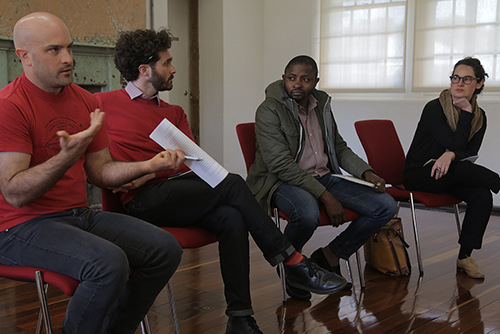with papers by Stuart Cooke, Alys Moody & Bonaventure Muzigirwa Munganga
An exploration of relations (and relationality) between literary communities, writers, and literary practices of the ‘South’, or the countries of southern latitudes (i.e. Southern Africa, Australia, the Pacific, and South America)
Female Orphan School, Western Sydney University
ABSTRACTS
Working with the Humedal Antiñir: Ethnographic, Transcultural Poetics in Southern Chile – Stuart Cooke
In this presentation I will introduce a wetland on the outskirts of Puerto Montt, Chile, as a site for transcultural poetic encounter. Working in collaboration with acclaimed Mapuche-Huilliche poet and activist Paulo Huirimilla, I am detailing the ecological and cultural importance of the Humedal Antiñir and its potency as a site for story and poetry. In my presentation I will describe the Humedal as a site of shared, indigenous and non-indigenous enquiry and will propose, on the basis of insights drawn from this enquiry, some new approaches to site-specific research. I will also provide an introduction to Huirimilla’s poetics, and will contextualise his thought in terms of some ‘Northern’ and ‘Southern’ theory.
Through creative practice (a series of poems authored by Huirimilla and myself), translation (between English, Mapudungun and Spanish), literary analysis and fieldwork, including interviews with Huirimilla, Mapuche elders and local scientists and archaeologists, Huirmilla and I are hoping to evoke something of the transcultural complexity of the Humedal. We argue that open, exploratory poetic forms are necessary to account for the complexity of knowledges at play. Importantly, our methods are not directed ‘inwards’ in order to explore our interiorities, nor do they seek to describe, in static, timeless details, the features of an inanimate, uninhabited natural landscape.
In sum, our research is interested in the following questions, which I will attempt to answer during the course of the presentation:
a) why is the Humedal a fecund site for poetry?
b) what is a decolonial, ethnographic poetics?
c) how might such knowledge ‘move’ transculturally, or be translated for non-Huilliche and/or international readers?
The Aesthetics and Ethics of the Mesh in Kwaymullina’s tribe trilogy – Muzigirwa Munganga
The indigenous people of the settler colonies of the South are often doubly othered, thought of as belonging to prehistoric, pre-technological societies and relegated to the lowest positions in these countries. Yet indigenous responses to pressing global issues, as expressed through science fiction thought of as a literature of ideas, I argue, can help us to think about how to confront the challenges of a world facing an unprecedented ecological crisis. This paper will focus on the ecological thought and the idea of interconnectedness among human and nonhuman beings (the ‘mesh’) in Ambelin Kwaymullina’s tribe trilogy. It will discuss the narrative strategies used to foreground the mesh, the specific ensuing local and translocal epistemic issues and how the texts construct a specific readership which is enabled to make sense of the mesh through different cognitive processes and thus responds to the narratives’ aesthetic, emotive, ethical, and political invitations.
Against “the South”: Literary Relation and the Grounds of Comparison – Alys Moody
J. M. Coetzee’s attempt to evolve a framework for analysing the literature of “the South” has evolved primarily through a consideration of white settler colonial writing from South Africa, Australia, and Argentina. While—as the other papers in this session demonstrate—there is ample scope for connections along southern lines that unsettle the settler colonial frame of this concept, this paper is interested in interrogating the framework itself. What are the limits of taking such a large-scale geographical concept as the southern hemisphere as a framework for analysing cultural formations? What other lines of literary relationality does such a framework cut through or preclude? And is it productive to recuperate a framework designed for comparative work across settler colonial populations, in order to examine these colonies’ indigenous peoples? Such questions raise issues about how we establish grounds for comparison, and about what the political, as well as intellectual and aesthetic, stakes of such comparisons may be.
BIOGRAPHIES
Stuart Cooke is Senior Lecturer in Creative Writing and Literary Studies at Griffith University. His books include George Dyuŋgayan’s Bulu Line: a West Kimberley Song Cycle (2014), Speaking the Earth’s Languages: a Theory for Australian-Chilean Postcolonial Poetics (2013), and the poetry collections Opera (2016) and Edge Music (2011). His translation of Gianni Siccardi’s The Blackbird (from Argentina) is forthcoming with Vagabond Press.
Alys Moody is a Lecturer in English at Macquarie University. She is the author of The Art of Hunger: Aesthetic Autonomy and the Afterlives of Modernism, forthcoming with Oxford University Press later this year and, with Stephen J. Ross, is the editor of an anthology of source texts for global modernism, scheduled for publication with Bloomsbury in 2019.
Bonaventure Muzigirwa Munganga is a Congolese (from D.R. Congo) Scientia PhD student in English literary studies at UNSW. He holds an MA in Literary Stylistics from the University of Birmingham (UK), where he wrote a thesis on relevance theory and narrative suspense under the supervision of Michael Toolan. His research interests span literary stylistics, literary theory and criticism, narrative analysis in fiction and film, (post)modernist and contemporary literature and theory, especially the interdisciplinary areas of ecocriticism in recent fiction.

